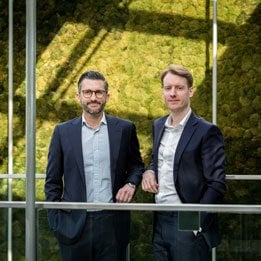

| PensionDanmark


PensionDanmark
Team size: Two
Key team members: Christian N. Riise-Knudsen, Søren Kokholm
Major legal advisers: Kromann Reumert, Accura Law Firm, Bruun & Hjejle, Bech Bruun Law Firm, Gorrissen Federspiel, DLA Piper, Ropes & Gray, NautaDutilh N.V., Morgan, Lewis & Bockius
Can you give an idea of the most significant cases or transactions that your legal team has recently been involved in?
One of the most significant transactions is a novel and innovative take on Public-Private Partnerships (PPP), enabling the Danish Navy to acquire multiple new vessels through a model where significant efficiencies for the Danish Navy is expected to be achieved.
The PPP will enable Denmark to build and scale its capabilities within naval shipbuilding, which is particularly relevant considering the current macro environment characterised by an increased focus on security of supply and safeguarding of critical functions such as offshore energy infrastructure. Alongside our consortium partners, we will be responsible for the design, construction, financing, and delivery of the vessels.
The challenge for the legal team was to structure the PPP in a way that mitigated risks, reduced financial exposure, and complied with the intensified regulation, while aligning the interests of the parties and navigating complex public procurement requirements. Concurrently, the legal team had to negotiate complex consortia-related agreements, ensuring an appropriate governance structure and interest alignment in addition to a risk management framework for a project that could potentially span over several years.
Through close collaboration with the Danish Navy, we believe that we have helped create a highly relevant, sustainable, and bespoke model for PPPs that has the potential to be utilised outside of Denmark as well.
Other significant transactions include establishing a new strategic platform for PensionDanmark as a fund-of-one, offering customised financing for the shipping industry, and the development of a new sustainable ferry solution for Danish islands and crossings.
Looking forward, what technological advancements do you feel will impact the role of in-house legal teams in the future the most?
While there are many technological advancements that are likely to have an impact on the role of in-house legal teams, we believe that AI will have the most material impact going forward. AI has the potential to revolutionise the legal industry, by automating time consuming and repetitive tasks such as legal research, contract review and contract management and, most importantly for us, legal due diligence.
We believe that by utilising the right AI systems, we will be able to reduce the extent of legal work we outsource to external advisors and thus, reduce our overall costs over time for the benefit of our company and our members.
How has the increasing consciousness of climate change and sustainability affected your company and the team’s priorities?
The increased consciousness of climate change and sustainability has indeed affected our company and consequently, the team’s priorities and work in several ways.
The investment strategy within the private markets industry revolves significantly around making sustainable and renewable investments. We have advised on investments spanning from off and onshore wind farms, energy islands, substantial commitments to infrastructure funds and venture companies that work with impact solutions such as Power-to-X.
In connection with our due diligence process related to potential acquisitions, ESG and sustainability have become separate and integrated workstreams in the overall investment process. Additionally, new investments within the real estate portfolio are classified as green or sustainable, with high rankings within the applicable sustainability certification systems.
Having a sustainable and climate-integrated portfolio has become a priority for institutional investors and family offices and thus, also for our team’s everyday work.
On a more practical level, being a global investor, we have become increasingly focused on switching from physical meetings to online meetings wherever possible, thereby reducing the team’s carbon footprint.